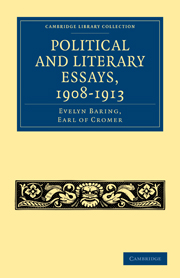Book contents
- Frontmatter
- PREFACE
- Contents
- “THE EDINBURGH REVIEW”
- “THE QUARTERLY REVIEW”
- “THE NINETEENTH CENTURY AND AFTER”
- “THE SPECTATOR”
- VIII DISRAELI
- IX RUSSIAN ROMANCE
- X THE WRITING OF HISTORY
- XI THE GREEK ANTHOLOGY
- XII LORD MILNER AND PARTY
- XIII THE FRENCH IN ALGERIA
- XIV THE OTTOMAN EMPIRE
- XV WELLINGTONIANA
- XVI BURMA
- XVII A PSEUDO-HERO OF THE REVOLUTION
- XVIII THE FUTURE OF THE CLASSICS
- XIX AN INDIAN IDEALIST
- XX THE FISCAL QUESTION IN INDIA
- XXI ROME AND MUNICIPAL GOVERNMENT
- XXII A ROYAL PHILOSOPHER
- XXIII ANCIENT ART AND RITUAL
- XXIV PORTUGUESE SLAVERY
- XXV ENGLAND AND ISLAM
- XXVI SOME INDIAN PROBLEMS
- XXVII THE NAPOLEON OF TAINE
- XXVIII SONGS, PATRIOTIC AND NATIONAL
- XXIX SONGS, NAVAL AND MILITARY
- INDEX
XVII - A PSEUDO-HERO OF THE REVOLUTION
Published online by Cambridge University Press: 07 September 2011
- Frontmatter
- PREFACE
- Contents
- “THE EDINBURGH REVIEW”
- “THE QUARTERLY REVIEW”
- “THE NINETEENTH CENTURY AND AFTER”
- “THE SPECTATOR”
- VIII DISRAELI
- IX RUSSIAN ROMANCE
- X THE WRITING OF HISTORY
- XI THE GREEK ANTHOLOGY
- XII LORD MILNER AND PARTY
- XIII THE FRENCH IN ALGERIA
- XIV THE OTTOMAN EMPIRE
- XV WELLINGTONIANA
- XVI BURMA
- XVII A PSEUDO-HERO OF THE REVOLUTION
- XVIII THE FUTURE OF THE CLASSICS
- XIX AN INDIAN IDEALIST
- XX THE FISCAL QUESTION IN INDIA
- XXI ROME AND MUNICIPAL GOVERNMENT
- XXII A ROYAL PHILOSOPHER
- XXIII ANCIENT ART AND RITUAL
- XXIV PORTUGUESE SLAVERY
- XXV ENGLAND AND ISLAM
- XXVI SOME INDIAN PROBLEMS
- XXVII THE NAPOLEON OF TAINE
- XXVIII SONGS, PATRIOTIC AND NATIONAL
- XXIX SONGS, NAVAL AND MILITARY
- INDEX
Summary
“The Spectator,” July 5, 1913
If it be a fact, as Carlyle said, that “History is the essence of innumerable biographies,” it is very necessary that the biographies from which that essence is extracted should be true. It was probably a profound want of confidence in the accuracy of biographical writing that led Horace Walpole to beg for “anything but history, for history must be false.” Modern industry and research, ferreting in the less frequented bypaths of history, have exposed many fictions, and have often led to some strikingly paradoxical conclusions. They have substituted for Cambronne's apocryphal saying at Waterloo the blunt sarcasm of the Duke of Wellington that there were a number of ladies at Brussels who were termed “la vieille garde,” and of whom it was said “elles ne meurent pas et se rendent toujours.” They have led one eminent historian to apologise for the polygamous tendencies of Henry VIII.; another to advance the startling proposition that the “amazing” but, as the world has heretofore held, infamous Emperor Heliogabalus was a great religious reformer, who was in advance of his times; a third to present Lucrezia Borgia to the world as a much-maligned and very virtuous woman; and a fourth to tell us that the “ever pusillanimous” Barere, as he is called by M. Louis Madelin, was “persistently vilified and deliberately misunderstood.” Biographical research has, moreover, destroyed many picturesque legends, with some of which posterity cannot part without a pang of regret.
- Type
- Chapter
- Information
- Political and Literary Essays, 1908–1913 , pp. 298 - 306Publisher: Cambridge University PressPrint publication year: 2010First published in: 1913

